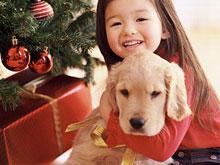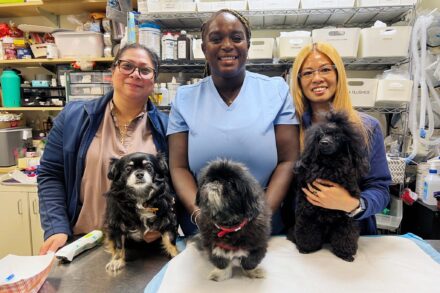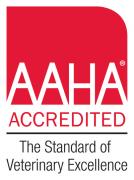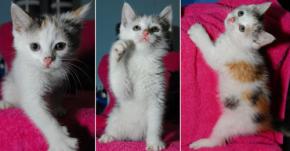Holiday Safety Tips for Your Pets

Holiday Safety Tips for Your Pets
The winter holidays should be a joyous time for people and pets alike. In the midst of your revelries and big family dinners, don’t let your home become a hazardous place for your dog or cat. Here are 10 tips on how to keep your pets safe this holiday season:
1. Fatty Foods Aren’t Good for Sparky Either Who can resist gravy on roast beef or a cup of egg nog? Spills on the kitchen floor or overturned glasses and gravy boats are what your dog is wishing for this year. Lapping up these high fat treats puts him at risk for severe gastrointestinal upset. Delicious, but oily potato pancakes will do the same.
2. Other Holiday Foods on the Naughty List Chocolate contains a caffeine-like substance which is toxic in animals, known to cause hyperactivity, seizures and heart arrhythmias (dry cocoa powder is the most dangerous). Onions can cause anemia in dogs and cats. Raisins are often found in many holiday baked goods and for an unknown reason, raisins and their hydrated relative, grapes, can cause kidney failure in dogs.
3. Trash Cans Become Holiday Buffets for Pets Don’t forget about the trash can in your kitchen as you whiz about making final preparations for guests – it can become a dangerous buffet for your pet. If eaten, the string used to tie the meat and the discarded bones can lodge themselves in the digestive tract and require a surgical procedure to remove. Bones lodged in the esophagus can be fatal if it is severely damaged.
4. Raise Your Glasses! Not to propose a toast, but do ask guests not to set glasses down on the floor or on a low coffee table where pets get easy access to those sweet, tasty, alcoholic holiday drinks. Pets will keep slurping and can become intoxicated and ill quickly.
5. Wrapping Risks The festive bows, twine, paper and tags of the holiday season can wrap your pet up in a heap of trouble if they’re ingested. Cats and puppies love to play with puffy bows and balled up wrapping, and may in fact swallow them. All animals will be tempted to eat through the pretty packaging surrounding gifts of food, so make sure to put them out of pets’ reach. The ingested wrapping can get stuck in the intestine and cause a blockage as well as damage the intestinal wall.
6. Christmas Tree Safety 101 The water in your Christmas tree stand is mighty inviting to a thirsty pet. Keep it covered so they can’t lap up water that has been tainted by pinesap and tree preservatives. Anchor your tree well and display it in a secure location to prevent pets from knocking it over. String the lights tightly and put the all dangling cords behind furniture to limit your pet’s interest in playing with, and possibly chewing on them. Severe electrical burns and electrocution can result. Cats especially have been known to nibble on the tree branches and sample the tinsel, both of which can be dangerous to their digestive tracts. Lastly, choose your ornaments carefully. Glass ornaments that shatter easily if knocked off the tree leave shards for your pet to step on and ingest. The best bet is to not let animals into the room where the tree is standing without human supervision.
7. Let There Be Light (as long as your pets can’t get near it!) Candles and lamps are a part of many holiday celebrations like Hanukah, Christmas, Divali and Kwanzaa. Your Menorah or Kinara should be in a place that is inaccessible to your pets and should not burn unattended. Your cat can easily light itself on fire by brushing its tail up against a burning candle or start a house fire by tipping it over.
8. Mistle-no’s Colorful houseplants abound at holiday time but many are poisonous if nibbled on by your pets. Poinsettia, mistletoe, holly and Cyclamen’s tuberous roots are toxic to pets and lilies and amaryllis will cause kidney failure if eaten by your cat. It is best to be safe and not have these plants in your home if you share it with a pet.
9. Break out Star With so many holiday guests coming and going, it is easy for pets to get agitated or escape out the door. Be sure your pets are crated or leashed when you expect guests to prevent them from running away. And with all of the new voices, music and loud noises holiday festivities often bring, even the calmest pet can get spooked. Keeping pets in a closed room will help minimize the anxiety.
10. Not a Good Surprise Present Remember that a pet of any type does not make a good gift. No matter how much your neighbor or family member covets your beloved Fido or Whiskers, other families need to be prepared for the time and financial commitment a pet requires. A pet should never be a surprise gift anytime of the year. If your pet has ingested any foods or materials that may be toxic, contact your veterinarian immediately or call Animal Poison Control at (888) 426-4435, 24 hours a day. The Animal Medical Center is open 24 hours a day, 7 days a week for emergency, routine and specialty care: (212) 838-8100.
For nearly a century, The Animal Medical Center has been a national leader in animal health care, known for its expertise, innovation and success in providing routine, specialty and emergency medical care for companion animals. Thanks in part to the enduring generosity of donors, The AMC is also known for its outstanding teaching, research and compassionate community funds. Please help us to continue these efforts. Send your contribution to: The Animal Medical Center, 510 East 62nd Street, New York, NY 10065. For more information, visit www.amcny.org. To make an appointment, please call 212.838.7053.


































